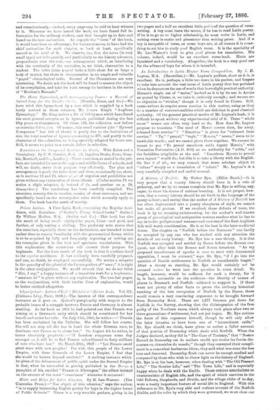An Introduction to Latin Elegiac Verse Composition. By J. H.
Lupton, M.A. (Macmillan.)---Mr. Lupton's preface, short as it is, is excellent. He is, perhaps, a little too stern in his purism, and forgets to take into account the vast mass of Latin poetry that has perished when he denounces the use of words that have slight poetical authority. Horace's single use of "webs," backed as it is by its use in Aeolus as quoted by Cicero, is, we take it, authority enough ; and we can see no objection to "rivulus," though it is only found in Cicero. Still, verse-writers do require some caution in this matter, using as they do a number of conventionalities which are deficient in good classical authority. Of the general practical merits of Mr. Lupton's book, it is difficult to speak without any experimental trial of it. These "whole sense" verses are often very hard to do. How does Mr. Lupton propose to translate "The sand of Meroe covers thee, far away, released from service" ? " Emeritus " is given for "released from service." " Te," " procal," " tegit," " Meroes," arena," seem to be inevitable words ; and we cannot piece them together. We cannot be meant to put " Te procul emeritum sable tegunt Meroes," with Venantius Fortunatns (A.D. 600) as an authority for "sable," and the forbidden trisyllable at the end. " Emeritum Meroes to precut arva tegunt " would do ; but this is to take a liberty with the English. On line 9 of ail., we may remark that some scholars object to "minus" simply as a translation of "infant." Mr. Lupton's is a very carefully compiled and useful manual.


































 Previous page
Previous page